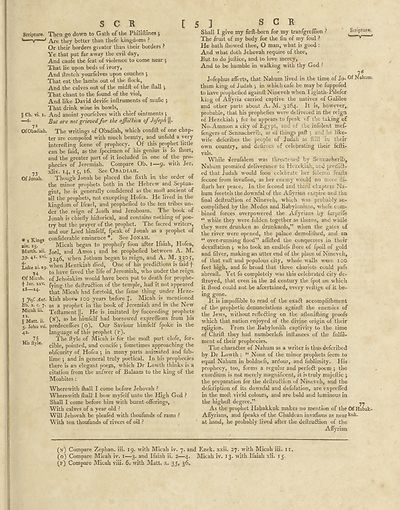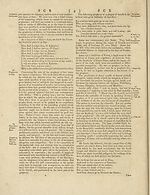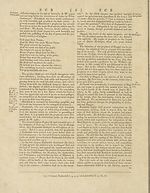Encyclopaedia Britannica, or, a Dictionary of arts, sciences, and miscellaneous literature : enlarged and improved. Illustrated with nearly six hundred engravings > Volume 19, Scripture-SUG
(11) Page 5
Download files
Complete book:
Individual page:
Thumbnail gallery: Grid view | List view

SCR
Scripture. Then go down to Gath of the Philiftmes j
•' Are they better than thefe kingdoms ?
Or their borders greater than their borders ?
Ye that put far away the evil day,
And caufe the feat of violence to come near j
That lie upon beds of ivory,
And ftretch yourfelves upon couches j
That eat the lambs out of the flock,
And the calves out of the midft of the Hall j
That chant to the found of the viol,
And like David devife inftruments of mufic ;
That drink wine in bowls,
And anoint yourfelves with chief ointments ;
But are not grieved for the affliBion of Jofeph ||.
[ 5 1 SCR
Shall I give my firft-born for my tranfgreflion ?
The fruit of my body for the fin of my foul ?
He hath (bowed thee, O man, what is good :
And what doth Jehovah require of thee,
Eut to do juftice, and to love mercy,
And to be humble in walking with thy God ?
Scripture.
1| Ch. vi. i.
—6.
OfObadxah,
73
Of Jonah.
# i Kings
xiv. 25.
Matth. xii.
39. 41. xvi.
4-
Luke xi. *9.
74
Of Micah.
f Jer. xxv.
1=8—24.
t Jof- Ant.
lib. x. c. 7.
Micah iii.
12.
|| Matt. ii.
5. John vii.
42.
. 75
His ftyle.
The writings of Obadiah, which confift of one chap¬
ter are compofed with much beauty, and unfold a very
interefting fcene of prophecy. Of this prophet little
can be faid, as the fpecimen of his genius is fo (hort,
and the greater part of it included in one of the pro¬
phecies of Jeremiah. Compare Ob. I—9. with Jer.
xlix. 14, 15, 16. See Obadiah.
Though Jonah be placed the fixth in the order of
the minor prophets both in the Hebrew and Septua-
gint, he is generally confidered as the mod ancient of
all the prophets, not excepting Hofea. He lived in the
kingdom of Ifrael, and prophefied to the ten tribes un¬
der the reign of Joalh and Jeroboam. The book of
Jonah is chiefly hiftorical, and contains nothing of poe¬
try but the prayer of the prophet. The facred writers,
and our Lord himfelf, fpeak of Jonah as a prophet of
confiderable eminence *. See Jonah.
Micah began to prophefy foon after Ifaiah, Hofea,
Joel, and Amos j and he prophefied between A. M.
3246, when Jotham began to reign, and A. M. 3305,
when Hezekiah died, One of his predictions is laid f
to have faved the life of Jeremiah, who under the reign
of Jehoiakim would have been put to death for prophe-
fying the deftruCtion of the temple, had it not appeared
that Micah had foretold, the fame thing under Heze¬
kiah abov« 100 years before J. Micah is mentioned
as a prophet in the book of Jeremiah and in the New
Teftament ||. He is imitated by fucceeding prophets
(n), as he himfelf had borrowed expreflions from his
predeceflors (o). Our Saviour himfelf fpoke in the
language of this prophet (p).
The Ityle of Micah is for the moil part clofe, for¬
cible, pointed, and concife •, fometimes approaching the
obfcurity of Hofea 5 in many parts animated and fub-
lime ; and in general truly poetical. In his prophecies
there is an elegant poem, which Dr Lowth thinks is a
citation from the anfwer of Balaam to the king of the
Moabites :
Wherewith (hall I come before Jehovah ?
Wherewith (hall I bow myfelf unto the High God ?
Shall I come before him with burnt-offerings,
With calves of a year old ?
Will Jehovah be pleafed with thoufands of rams ?
With ten thoufands of rivers of oil ?
7*
Jofephus afferts, that Nahum lived in the time of Jo- Nahum,
tham king of Judah •, in which cafe he may be fuppofed
to have prophefied againfl: Nineveh when Tiglath-Pilefer
king of Ailyria carried captive the natives of Galilee
and other parts about A. M. 3264. It is, however,
probable, that his prophefies were delivered in the reign
of Hezekiah } for he appears to fpeak of the taking of
No-Ammon a city of Egypt, and of the infolent mef-
fengers of Sennacherib, as of things pad 5 and he like-
wife defcribes the people of Judah as Hill in their
own country, and defirous of celebrating their fefti-
vals.
While -Jerufalem was threatened by Sennacherib,
Nahum promiied deliverance to Hezekiah, and predict¬
ed that Judah would foon celebrate her folemn feails
fecure from invafion, as her enemy would no more di-
(lurb her peace. In the fecond and third chapters Na¬
hum foretels the downfal of the Afiyrian empire and the
final deftru£tion of Nineveh, which was probably ac-
compliflred by the Medes and Babylonians, whofe com¬
bined forces overpowered the Affyrians by furprife
“ while they were folden together as thorns, and while
they were drunken as drunkards,” when the gates of
the river were opened, the palace demolifhed, and an
“ over-running flood” aflifted the conquerors in their
devaftation j w ho took an endlefs (lore of fpoil of gold
and lilver, making an utter end of the place of Nineveh,
of that vail and populous city, whofe walls were 100
feet high, and fo broad that three chariots could pafs
abreaft. Yet fo completely was this celebrated city de-
(troyed, that even in the 2d century the fpot on which
it flood could not be afcertained, every veflige of it be-
ing gone.
It is impoflible to read of the exa6t accomplifhment
of the prophetic denunciations againfl: the enemies of
the Jews, without reflecting on the aftonifhing proofs
which that nation enjoyed of the divine origin of their
religion. From the Babylonifh captivity to the time
of Chrift they had numberlefs inllances of the fulfil¬
ment of their prophecies.
The character of Nahum as a writer is thus defcribed
by Dr Lowth : “ None of the minor prophets feem to
equal Nahum in boldnefs, ardour, and fublimity. His
prophecy, too, forms a regular and perfect poem ; the
exordium is not merely magnificent, it is truly majeftic j
the preparation for the deftruftion of Nineveh, and the
defcription of its downfal and defolation, are expreffed
in the mod vivid colours, and are bold and luminous in
the higheft degree.” ^
As the prophet Habakkuk makes no mention of the Of Habak»
Affyrians, and fpeaks of the Chaldean invafions as nearkuk.
at hand, he probably lived after the deftruilion of the
A (Tyrian
(n) Compare Zephan. iii. 19. with Micah iv. y. and Ezek. xxii. 27. with Micah iii. 11.
(o) Compare Micah iv. 1—3. and Ifaiah ii. 2—4. Micah iv. 13. with Ifaiah xli. 15.
(?) Compare Micah viii. 6. with Matt. x. 35, 36,
Scripture. Then go down to Gath of the Philiftmes j
•' Are they better than thefe kingdoms ?
Or their borders greater than their borders ?
Ye that put far away the evil day,
And caufe the feat of violence to come near j
That lie upon beds of ivory,
And ftretch yourfelves upon couches j
That eat the lambs out of the flock,
And the calves out of the midft of the Hall j
That chant to the found of the viol,
And like David devife inftruments of mufic ;
That drink wine in bowls,
And anoint yourfelves with chief ointments ;
But are not grieved for the affliBion of Jofeph ||.
[ 5 1 SCR
Shall I give my firft-born for my tranfgreflion ?
The fruit of my body for the fin of my foul ?
He hath (bowed thee, O man, what is good :
And what doth Jehovah require of thee,
Eut to do juftice, and to love mercy,
And to be humble in walking with thy God ?
Scripture.
1| Ch. vi. i.
—6.
OfObadxah,
73
Of Jonah.
# i Kings
xiv. 25.
Matth. xii.
39. 41. xvi.
4-
Luke xi. *9.
74
Of Micah.
f Jer. xxv.
1=8—24.
t Jof- Ant.
lib. x. c. 7.
Micah iii.
12.
|| Matt. ii.
5. John vii.
42.
. 75
His ftyle.
The writings of Obadiah, which confift of one chap¬
ter are compofed with much beauty, and unfold a very
interefting fcene of prophecy. Of this prophet little
can be faid, as the fpecimen of his genius is fo (hort,
and the greater part of it included in one of the pro¬
phecies of Jeremiah. Compare Ob. I—9. with Jer.
xlix. 14, 15, 16. See Obadiah.
Though Jonah be placed the fixth in the order of
the minor prophets both in the Hebrew and Septua-
gint, he is generally confidered as the mod ancient of
all the prophets, not excepting Hofea. He lived in the
kingdom of Ifrael, and prophefied to the ten tribes un¬
der the reign of Joalh and Jeroboam. The book of
Jonah is chiefly hiftorical, and contains nothing of poe¬
try but the prayer of the prophet. The facred writers,
and our Lord himfelf, fpeak of Jonah as a prophet of
confiderable eminence *. See Jonah.
Micah began to prophefy foon after Ifaiah, Hofea,
Joel, and Amos j and he prophefied between A. M.
3246, when Jotham began to reign, and A. M. 3305,
when Hezekiah died, One of his predictions is laid f
to have faved the life of Jeremiah, who under the reign
of Jehoiakim would have been put to death for prophe-
fying the deftruCtion of the temple, had it not appeared
that Micah had foretold, the fame thing under Heze¬
kiah abov« 100 years before J. Micah is mentioned
as a prophet in the book of Jeremiah and in the New
Teftament ||. He is imitated by fucceeding prophets
(n), as he himfelf had borrowed expreflions from his
predeceflors (o). Our Saviour himfelf fpoke in the
language of this prophet (p).
The Ityle of Micah is for the moil part clofe, for¬
cible, pointed, and concife •, fometimes approaching the
obfcurity of Hofea 5 in many parts animated and fub-
lime ; and in general truly poetical. In his prophecies
there is an elegant poem, which Dr Lowth thinks is a
citation from the anfwer of Balaam to the king of the
Moabites :
Wherewith (hall I come before Jehovah ?
Wherewith (hall I bow myfelf unto the High God ?
Shall I come before him with burnt-offerings,
With calves of a year old ?
Will Jehovah be pleafed with thoufands of rams ?
With ten thoufands of rivers of oil ?
7*
Jofephus afferts, that Nahum lived in the time of Jo- Nahum,
tham king of Judah •, in which cafe he may be fuppofed
to have prophefied againfl: Nineveh when Tiglath-Pilefer
king of Ailyria carried captive the natives of Galilee
and other parts about A. M. 3264. It is, however,
probable, that his prophefies were delivered in the reign
of Hezekiah } for he appears to fpeak of the taking of
No-Ammon a city of Egypt, and of the infolent mef-
fengers of Sennacherib, as of things pad 5 and he like-
wife defcribes the people of Judah as Hill in their
own country, and defirous of celebrating their fefti-
vals.
While -Jerufalem was threatened by Sennacherib,
Nahum promiied deliverance to Hezekiah, and predict¬
ed that Judah would foon celebrate her folemn feails
fecure from invafion, as her enemy would no more di-
(lurb her peace. In the fecond and third chapters Na¬
hum foretels the downfal of the Afiyrian empire and the
final deftru£tion of Nineveh, which was probably ac-
compliflred by the Medes and Babylonians, whofe com¬
bined forces overpowered the Affyrians by furprife
“ while they were folden together as thorns, and while
they were drunken as drunkards,” when the gates of
the river were opened, the palace demolifhed, and an
“ over-running flood” aflifted the conquerors in their
devaftation j w ho took an endlefs (lore of fpoil of gold
and lilver, making an utter end of the place of Nineveh,
of that vail and populous city, whofe walls were 100
feet high, and fo broad that three chariots could pafs
abreaft. Yet fo completely was this celebrated city de-
(troyed, that even in the 2d century the fpot on which
it flood could not be afcertained, every veflige of it be-
ing gone.
It is impoflible to read of the exa6t accomplifhment
of the prophetic denunciations againfl: the enemies of
the Jews, without reflecting on the aftonifhing proofs
which that nation enjoyed of the divine origin of their
religion. From the Babylonifh captivity to the time
of Chrift they had numberlefs inllances of the fulfil¬
ment of their prophecies.
The character of Nahum as a writer is thus defcribed
by Dr Lowth : “ None of the minor prophets feem to
equal Nahum in boldnefs, ardour, and fublimity. His
prophecy, too, forms a regular and perfect poem ; the
exordium is not merely magnificent, it is truly majeftic j
the preparation for the deftruftion of Nineveh, and the
defcription of its downfal and defolation, are expreffed
in the mod vivid colours, and are bold and luminous in
the higheft degree.” ^
As the prophet Habakkuk makes no mention of the Of Habak»
Affyrians, and fpeaks of the Chaldean invafions as nearkuk.
at hand, he probably lived after the deftruilion of the
A (Tyrian
(n) Compare Zephan. iii. 19. with Micah iv. y. and Ezek. xxii. 27. with Micah iii. 11.
(o) Compare Micah iv. 1—3. and Ifaiah ii. 2—4. Micah iv. 13. with Ifaiah xli. 15.
(?) Compare Micah viii. 6. with Matt. x. 35, 36,
Set display mode to:
![]() Universal Viewer |
Universal Viewer | ![]() Mirador |
Large image | Transcription
Mirador |
Large image | Transcription
Images and transcriptions on this page, including medium image downloads, may be used under the Creative Commons Attribution 4.0 International Licence unless otherwise stated. ![]()
| Permanent URL | https://digital.nls.uk/192695425 |
|---|
| Attribution and copyright: |
|
|---|
| Description | Ten editions of 'Encyclopaedia Britannica', issued from 1768-1903, in 231 volumes. Originally issued in 100 weekly parts (3 volumes) between 1768 and 1771 by publishers: Colin Macfarquhar and Andrew Bell (Edinburgh); editor: William Smellie: engraver: Andrew Bell. Expanded editions in the 19th century featured more volumes and contributions from leading experts in their fields. Managed and published in Edinburgh up to the 9th edition (25 volumes, from 1875-1889); the 10th edition (1902-1903) re-issued the 9th edition, with 11 supplementary volumes. |
|---|---|
| Additional NLS resources: |
|

